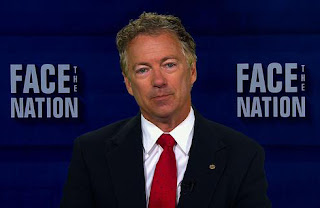 |
| Paul was on "Face the Nation" and "Fox News Sunday." |
Kentucky Health News
His Kentucky seatmate and fellow Republican has been making most of the news on the health-insurance bill in the U.S. Senate, but Sen. Rand Paul took a higher profile Sunday, explaining his opposition to Senate Majority Leader Mitch McConnell's bill on two national-television interview programs.
“We won four elections on repealing Obamacare … but this doesn’t,” the Bowling Green ophthalmologist said on "Fox News Sunday."
Paul has long opposed a basic function of the 2010 law, which subsidizes private health insurance that the law made more expensive by requiring broad coverage. McConnell's bill would keep the Obamacare taxes on higher incomes in order to shore up the subsidized insurance market for individuals, which companies are leaving, saying they are losing money in it.
“That is not a Republican idea, to give taxpayer money to a private industry,” Paul said. “The Republican plan doesn’t fix the death spiral of ObamaCare, it merely subsidizes it.”
Paul also said he doesn't think McConnell has the votes to pass the revised bill the leader rolled out last week. Paul and moderate Republican Sen. Susan Collins of Maine have announced against it, leaving McConnell no votes to spare among the Senate's 52 Republicans.
“I still think the entire 52 of us can get together on a more narrow, clean repeal,” Paul said. McConnell has declined to work with Democrats, saying they don't want to do anything Republicans want to do, but has warned that if his bill doesn't pass, they will have to work together to stabilize the Obamacare-subsidized individual insurance market.
On CBS's "Face the Nation," Paul argued that Obamacare's requirements "cause the prices to rise, which chase young, healthy people out of the marketplace, and leads to what people call adverse selection, where you have a sicker and sicker insurance pool and the premiums keep rising through the roof."
When host John Dickerson noted that proponents of the system say some sort of transition is needed to limit cost increases for sicker people, Paul said, “Insurance companies make about $15 billion in profit every year. I'm not for any taxpayer money going to … an industry that makes $15 billion a year. I think it's absolutely wrong. It's not at all consistent with conservative principles, free market principles or being a Republican. It also has nothing to do with repeal. I mean, we promised the voters for four elections. They elected us to repeal Obamacare. And now we're going to keep most of the taxes, keep the regs, keep the subsidies and create a giant bailout super fund for the insurance companies. I just don't see it.”
Asked how he would address the issue, Paul said people in the individual market should be allowed to form groups to share risk. “Right now, the insurance companies have gamed the system such that they get enormous profit from the group plans. And then they lose money in the individual markets and they whine and they come to Washington. They write the bill and they get bailed out. It's a terrible situation.”
Dickerson said, "The complaint about that is that people will associate with healthier people. Their premiums will be low. The sicker will be stuck in their association of sick people and the premiums will be high."
Paul said that won't happen because current rules say anyone in a group has to be covered. "The insurance companies love this game. They get all the healthy people and they reap enormous profits. And then if you get sick, you leave employment, you don't have insurance. Then they gouge you, drop you."
McConnell has said that Paul's plan can't be part of the Senate bill because it does not relate directly to federal taxes or spending, a requirement under the budget-reconciliation rules that Republicans are using to pass the bill because they don't have enough votes to stop a Democratic filibuster.
No comments:
Post a Comment